Early Signs of Stomach Cancer Most People Miss
Stomach cancer, also known as gastric cancer, remains a significant global health concern, with over one million new cases diagnosed each year according to the World Health Organization. The stomach plays a crucial role in digestion, breaking down food and absorbing nutrients. Unfortunately, the early symptoms of this disease are often subtle or mistaken for common digestive issues, leading to late-stage diagnoses and poorer outcomes. This article explores the subtle warning signs that are frequently overlooked, emphasizing the importance of early recognition and timely intervention.
1. Persistent Indigestion

Chronic indigestion, medically referred to as dyspepsia, is often dismissed as a minor inconvenience or attributed to dietary choices. However, when indigestion occurs frequently—especially if it lasts for several weeks—it can be an early indicator of abnormal changes in the stomach lining, which may eventually develop into cancer. Persistent symptoms such as bloating, discomfort, or a burning sensation in the upper abdomen after eating are not uncommon. For example, a person who routinely experiences heartburn after every meal, regardless of food choices, may be witnessing one of the subtle signs of a more serious underlying condition.
Unlike occasional heartburn, which many people experience from time to time, ongoing indigestion that does not respond to over-the-counter antacids or dietary adjustments should not be ignored. It is essential to consult a healthcare professional if these symptoms persist, as early evaluation can help rule out more serious conditions, including stomach cancer. According to the American Cancer Society, chronic indigestion is one of the most commonly missed early warning signs. Prompt medical attention can lead to earlier detection and more effective treatment outcomes.
2. Unexplained Weight Loss

Unintentional weight loss—shedding pounds without changes in diet or physical activity—can be an early sign of stomach cancer. Cancer cells alter the body’s metabolism, often causing the body to burn more calories at rest and disrupting normal appetite signals. This metabolic change can lead to a noticeable decrease in body weight over a short period. While some illnesses, such as hyperthyroidism or diabetes, can also cause unintentional weight loss, cancer-related weight loss is often more rapid and persistent, accompanied by other symptoms like fatigue or loss of appetite.
For instance, a person may notice their clothes fitting more loosely or the numbers dropping on the scale, despite not making any intentional efforts to lose weight. Unlike weight changes linked to diet or exercise routines, this type of weight loss is involuntary and can be accompanied by a general sense of malaise. According to the American Society of Clinical Oncology, unexplained weight loss is a red flag that warrants prompt medical evaluation. If you or someone you know is losing weight without explanation—especially if it’s more than 5% of body weight over six to twelve months—it’s crucial to consult a healthcare provider to rule out serious underlying conditions.
3. Feeling Full Quickly

Early satiety, or the sensation of feeling full after eating only a small amount of food, is a subtle but important sign that can be associated with stomach cancer. This occurs when a tumor grows within the stomach, physically reducing its capacity or interfering with its normal function. As the tumor occupies space or affects the stomach’s ability to expand, individuals may notice they are unable to finish meals they once easily consumed. This feeling is distinct from the fullness experienced after overeating, which is typically predictable and related to the volume of food consumed.
Unlike the temporary discomfort following a large meal, early satiety persists and can become increasingly noticeable over days or weeks. A person might start skipping meals or eating less at each sitting simply because they feel uncomfortably full sooner than usual. According to Cancer Research UK, this symptom should not be ignored, especially if it occurs alongside other digestive changes. Persistently feeling full quickly is often overlooked or attributed to stress or minor digestive issues, but it can be an early warning sign of a developing stomach tumor. Consulting a healthcare professional is essential for early diagnosis and treatment.
4. Nausea and Vomiting

Nausea and vomiting are common digestive symptoms that can be caused by a wide array of conditions, from viral infections to food poisoning. However, in the context of stomach cancer, these symptoms may arise when a tumor obstructs the stomach’s normal emptying process, irritates the stomach lining, or disrupts digestive functions. Unlike the acute and typically short-lived nausea that accompanies food poisoning, the nausea related to a stomach tumor tends to be persistent or recurrent, sometimes worsening over time. Vomiting may occur intermittently or after eating, and in some cases, vomit may contain undigested food or even traces of blood.
It’s important to differentiate between occasional stomach upset and ongoing symptoms. If you notice that nausea or vomiting occurs frequently, lasts more than a week, or is associated with other warning signs like weight loss or early satiety, it should not be ignored. According to the Centers for Disease Control and Prevention (CDC), persistent nausea and vomiting warrant medical attention, especially if accompanied by blood in vomit or unexplained fatigue. Keeping a log of when these symptoms occur and what triggers them can be helpful information to share with your doctor for accurate diagnosis and timely intervention.
5. Blood in Stool

Stomach cancer can lead to internal bleeding when a tumor erodes blood vessels in the stomach lining. This blood may pass through the digestive tract and appear in the stool. While the bleeding can sometimes be visible—resulting in black, tarry stools (known as melena)—it is often occult, or hidden, and only detectable through specialized tests. This is distinctly different from the bright red blood commonly seen with hemorrhoids, which usually coats the surface of the stool and is associated with straining during bowel movements.
Because internal bleeding from stomach cancer tends to be slow and chronic, affected individuals may not notice any obvious changes in their stool. Over time, however, this hidden blood loss can lead to anemia, resulting in fatigue or shortness of breath. According to Mayo Clinic, testing for occult blood in the stool is an important diagnostic step if stomach cancer is suspected, especially in the presence of unexplained gastrointestinal symptoms. If you detect black or unusual stools, or if you are at risk for stomach cancer, ask your healthcare provider about appropriate screening tests. Early detection of internal bleeding can significantly improve treatment outcomes.
6. Anemia
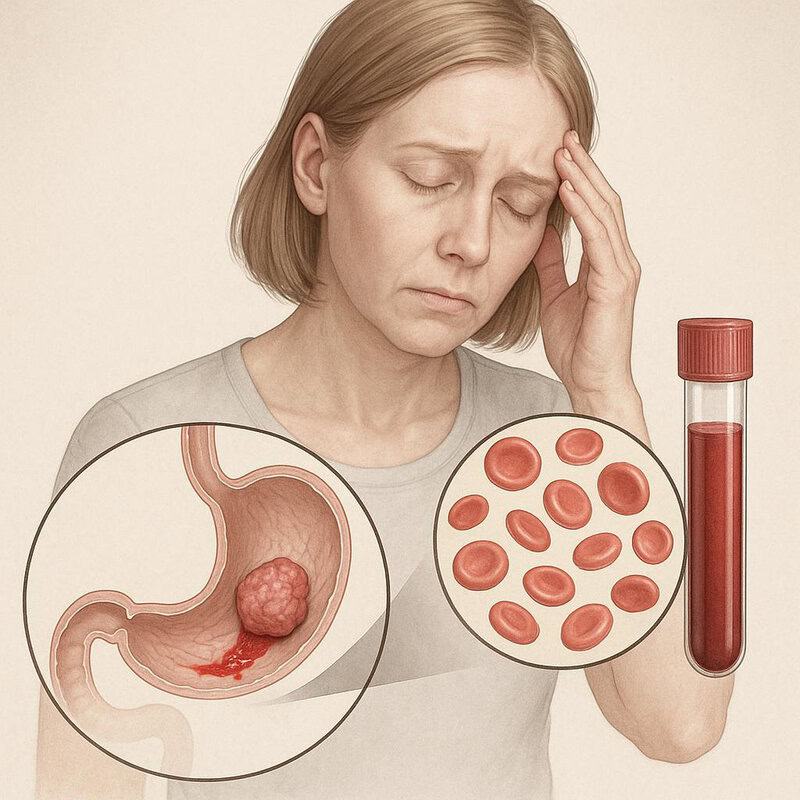
Chronic blood loss from a stomach tumor can gradually result in anemia, a condition marked by a deficiency of healthy red blood cells. This usually happens when slow, internal bleeding occurs over weeks or months, often unnoticed by the affected person. The body’s iron stores become depleted as it tries to compensate for this ongoing loss, leading to symptoms such as persistent fatigue, pale skin, dizziness, weakness, and sometimes shortness of breath. Unlike anemia caused by heavy menstrual periods—where the source of blood loss is clear—anemia due to stomach cancer can be more insidious and difficult to trace.
In many cases, individuals may not realize they are anemic until routine blood tests reveal low hemoglobin or hematocrit levels. According to American Cancer Society, unexplained anemia, particularly in adults who are not menstruating or do not have another obvious cause, should prompt further investigation for gastrointestinal bleeding or malignancy. If you notice ongoing tiredness, paleness, or any of the aforementioned symptoms, it is important to consult a healthcare provider. Blood tests can help identify anemia and guide additional diagnostic procedures to determine the underlying cause, enabling earlier intervention if stomach cancer is present.
7. Fatigue

Fatigue is a common yet nonspecific symptom that can be associated with a variety of health issues, from sleep deprivation and stress to chronic illnesses such as diabetes or thyroid disorders. In the context of stomach cancer, persistent fatigue often develops gradually and can be a result of anemia caused by chronic internal bleeding, nutritional deficiencies due to poor absorption, or the body’s metabolic response to cancer. This type of tiredness is similar to the profound exhaustion seen in longstanding illnesses, where rest does not provide relief and daily activities become increasingly difficult.
Fatigue related to stomach cancer may be accompanied by other subtle signs, such as unexplained weight loss or gastrointestinal discomfort, but it can also occur in isolation. According to information from the American Society of Clinical Oncology, ongoing fatigue that interferes with normal life and is not alleviated by sleep or lifestyle changes should be evaluated by a healthcare provider. While fatigue is common and often benign, it’s important to consider serious underlying causes—such as cancer—when it persists for several weeks, especially in the presence of other warning signs or in individuals with additional risk factors for gastric malignancy.
8. Loss of Appetite

Loss of appetite, or anorexia, is a classic but often overlooked symptom of stomach cancer. Cancerous growths in the stomach can interfere with normal hunger signals by affecting hormones and causing inflammation or discomfort after eating. As a result, people may begin to avoid meals or eat significantly less than usual. This decline in appetite may develop gradually or suddenly, and it typically doesn’t improve with time. The experience is somewhat similar to the temporary loss of appetite that occurs during the flu or other infections; however, in stomach cancer, the symptom tends to be persistent and not linked to an obvious short-term illness.
Monitoring changes in eating habits is crucial, especially if you find yourself skipping meals, feeling uninterested in favorite foods, or noticing a reduction in overall food intake without a clear explanation. Ongoing loss of appetite can quickly lead to weight loss and nutritional deficiencies, further compounding health problems. According to Cancer Research UK, appetite changes that last more than a couple of weeks—particularly when accompanied by other digestive symptoms—warrant medical evaluation. Keeping a diary of your eating patterns and how you feel before and after meals can provide valuable information for your healthcare provider.
9. Abdominal Pain or Discomfort

Abdominal pain or discomfort is a symptom that can originate from many causes, but when associated with stomach cancer, it often results from the tumor irritating or invading the stomach lining. This irritation can produce a dull, nagging ache or a sense of pressure in the upper abdomen. The discomfort may be intermittent at first but often becomes more persistent or intense as the tumor grows. This type of pain can easily be mistaken for common ailments such as gastritis or peptic ulcers, which also cause burning or aching sensations, particularly after eating.
The pain linked to stomach cancer tends to be less responsive to over-the-counter remedies and may gradually worsen over time. Unlike the transient pain of indigestion or mild gastritis, which typically improves with dietary changes or medication, cancer-related discomfort is more likely to linger and intensify, potentially radiating to the back or becoming constant. According to the American Cancer Society, persistent or unexplained abdominal pain should not be ignored, especially if it lasts for more than a few weeks or is associated with other warning signs. Early evaluation by a healthcare provider is essential for determining the underlying cause and initiating appropriate treatment.
10. Swelling or Bloating

Swelling or bloating in the abdomen is another potential early sign of stomach cancer that can be easily overlooked. Tumors in the stomach can obstruct normal digestion or even cause a buildup of fluid, known as ascites, within the abdominal cavity. This fluid accumulation results in a feeling of fullness, tightness, or visible swelling that persists throughout the day. Unlike the bloating experienced by individuals with irritable bowel syndrome (IBS), which often fluctuates with meals and may be relieved by passing gas or having a bowel movement, cancer-related swelling tends to be constant and may progressively worsen.
People may notice that their clothes fit more snugly around the waist, or that their abdomen appears distended even without significant weight gain. In some cases, this symptom is accompanied by discomfort, loss of appetite, or shortness of breath due to the pressure on surrounding organs. According to MD Anderson Cancer Center, any new or unexplained swelling or bloating—especially when persistent—should prompt a medical evaluation. Keeping track of when bloating occurs, how long it lasts, and any accompanying symptoms can provide important clues for your healthcare provider and support early diagnosis.
11. Difficulty Swallowing
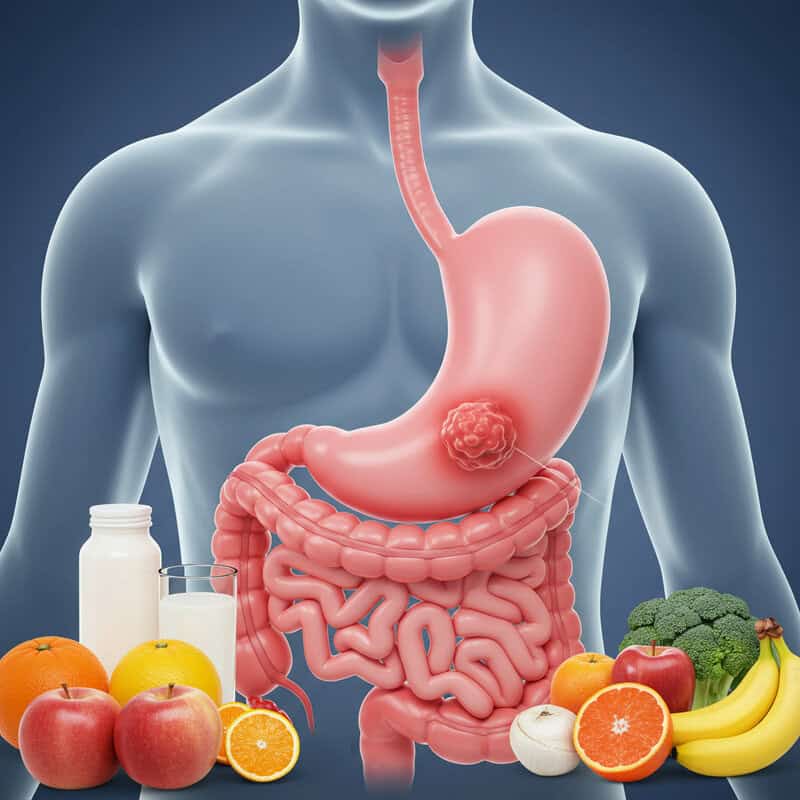
Difficulty swallowing, known medically as dysphagia, can occur if a tumor develops near the upper part of the stomach where it meets the esophagus. As the tumor grows, it may narrow or block the passage between the esophagus and the stomach, making it increasingly hard for food and liquids to pass through. At first, people may only notice mild discomfort or a sensation that food is “sticking” in the throat or chest, particularly with solid foods. Over time, even soft foods or liquids may become challenging to swallow.
This symptom is sometimes confused with the swallowing difficulties seen in chronic acid reflux or gastroesophageal reflux disease (GERD), where inflammation or scarring of the esophagus leads to similar sensations. However, while reflux-related dysphagia typically fluctuates and improves with acid-reducing medications, persistent or progressively worsening swallowing problems can signal an obstruction caused by a tumor. According to Cancer.Net, ongoing difficulty swallowing—especially if accompanied by weight loss, regurgitation, or chest pain—should be evaluated promptly by a healthcare professional. Early detection and intervention are crucial for improving treatment options and outcomes if a malignant growth is the underlying cause.
12. Heartburn

Heartburn is a burning sensation in the chest or upper abdomen that most people experience occasionally, often after consuming spicy foods, caffeine, or large meals. In these typical scenarios, heartburn is usually mild and resolves with over-the-counter antacids or dietary adjustments. However, when heartburn becomes persistent, severe, or occurs without an obvious trigger, it may signify a more serious underlying issue, including the possibility of stomach cancer. Tumors in the stomach or at the junction with the esophagus can cause acid and digestive juices to back up, irritating the lining and producing chronic heartburn.
Unlike ordinary heartburn that is predictable and short-lived, cancer-related heartburn frequently worsens over time and may not respond to standard treatments. According to the Cancer Research UK, a change in the pattern, frequency, or severity of heartburn—especially if it is accompanied by other symptoms such as weight loss, difficulty swallowing, or vomiting—should prompt further medical evaluation. Consulting a healthcare provider is essential if heartburn lasts more than a few weeks or becomes increasingly bothersome, as early investigation can help detect serious conditions like stomach cancer at a more treatable stage.
13. Black or Tarry Stools

Black or tarry stools, medically known as melena, can be a sign that there is bleeding higher up in the digestive tract, such as the stomach. When blood is exposed to stomach acids and enzymes, it becomes digested and turns stools a dark, sticky, and foul-smelling color. This is a key warning sign of gastrointestinal bleeding, which can occur if a stomach tumor erodes blood vessels in the stomach lining. It is important to distinguish this from the harmless darkening of stools caused by iron supplements or certain foods like black licorice, which do not typically cause a tar-like consistency or odor.
Unlike iron supplement side effects, which usually resolve when the supplement is stopped and do not accompany symptoms like fatigue or abdominal pain, melena tends to persist and may be associated with other signs of anemia or discomfort. According to Mayo Clinic, anyone who notices a sudden or unexplained change in stool color—especially stools that are black, tarry, and malodorous—should seek prompt medical attention. Testing for occult (hidden) blood in the stool is an essential diagnostic step and can help identify internal bleeding early, improving the likelihood of effective treatment.
14. Vomiting Blood
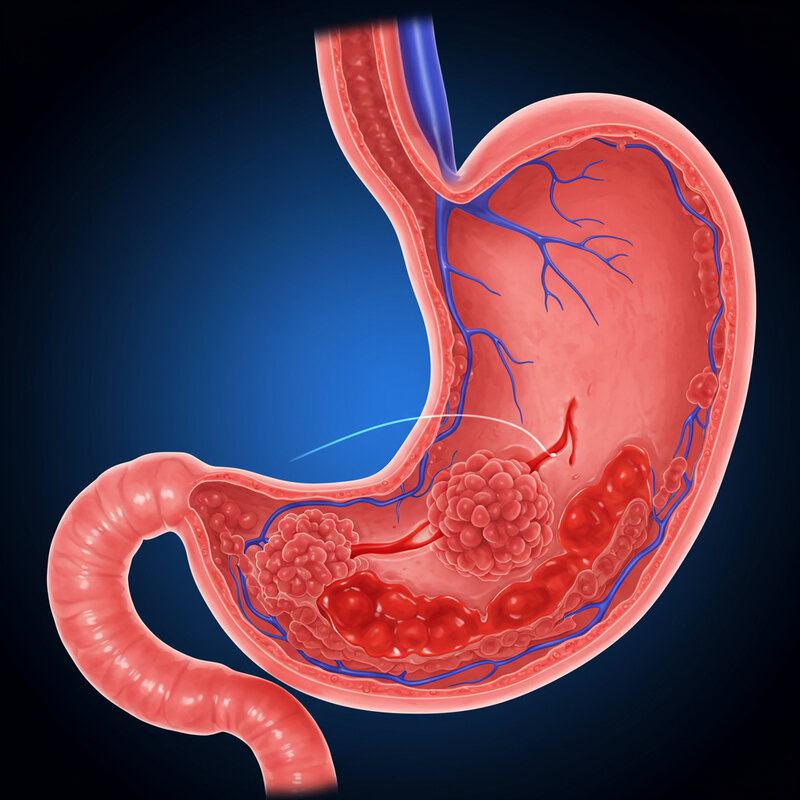
Vomiting blood, known medically as hematemesis, is a serious symptom that can occur when a stomach tumor erodes blood vessels and causes bleeding into the stomach. The blood may appear bright red or resemble coffee grounds if it has been partially digested by stomach acids. While vomiting blood is also a symptom seen in severe stomach ulcers or varices, it should never be ignored, regardless of the suspected cause. In the context of stomach cancer, this bleeding is often the result of the tumor’s direct invasion into the stomach lining, leading to injury and hemorrhage.
Unlike minor symptoms such as mild indigestion, hematemesis is a clear sign of significant internal bleeding and warrants immediate medical attention. According to the American Cancer Society, vomiting blood is considered a medical emergency, as it can quickly lead to shock, severe anemia, or even be life-threatening if not treated promptly. Anyone experiencing this symptom—whether the blood is fresh or dark and grainy—should seek emergency care without delay. Prompt intervention is vital to identify the bleeding source, stabilize the patient, and initiate appropriate treatment, whether the underlying cause is cancer or another gastrointestinal condition.
15. Unusual Belching

Belching, or burping, is a natural bodily function that helps release swallowed air from the stomach, often occurring after meals or carbonated drinks. However, when belching becomes excessive, persistent, or is accompanied by other digestive symptoms, it may indicate an underlying problem such as a disruption in normal stomach function. Stomach cancer can interfere with digestion by altering the stomach lining, affecting gastric emptying, or producing inflammation, all of which can lead to frequent or unusual belching.
Unlike normal belching, which typically follows eating or drinking and resolves quickly, abnormal belching may persist for hours, be unrelated to food intake, or occur alongside symptoms like early satiety, bloating, or abdominal discomfort. According to Cancer Treatment Centers of America, persistent belching that is new, unusually frequent, or worsening should not be ignored—especially if it is associated with other warning signs of stomach cancer. If you notice a change in your belching pattern that cannot be explained by diet or lifestyle, it is important to consult a healthcare provider. Early evaluation and intervention can help detect gastric disorders at a stage when treatment is most effective.
16. Unexplained Back Pain

Back pain is a common complaint, often resulting from muscle strain, poor posture, or spinal issues. However, in rare cases, pain originating from the stomach can be referred to the back due to shared nerve pathways. As a stomach tumor grows, it can invade nearby tissues or irritate nerves, causing discomfort that radiates to the middle or upper back. This type of pain is different from typical muscular back pain, which is usually related to movement, physical activity, or specific postures, and often improves with rest or stretching.
Referred pain from a stomach tumor tends to be more persistent, dull, or deep-seated, and may not change with movement or position. If back pain develops suddenly and is accompanied by other gastrointestinal (GI) symptoms—such as indigestion, nausea, unexplained weight loss, or changes in appetite—it should be taken seriously. According to MD Anderson Cancer Center, unexplained back pain in conjunction with digestive symptoms warrants prompt medical evaluation. Seeking care early can help distinguish between benign causes and more serious underlying conditions like stomach cancer, potentially facilitating earlier diagnosis and improved treatment outcomes.
17. Mild Fever

Mild or low-grade fevers, defined as a body temperature slightly above normal, can be a subtle sign of chronic inflammation within the body. In the case of stomach cancer, ongoing inflammation or the immune response to a tumor may trigger these persistent, mild temperature elevations. Unlike the high, abrupt fevers typically associated with viral or bacterial infections—which often come with chills, body aches, and resolve within days—cancer-related fevers are more likely to be low-grade, intermittent, and last for weeks or months without an obvious cause.
People may notice occasional warmth, sweating, or feeling flushed, but without the acute symptoms of infection. This can easily be overlooked or attributed to stress, overexertion, or minor illness. However, according to American Cancer Society, any unexplained and persistent change in body temperature—especially if it is not accompanied by typical cold or flu symptoms and lasts more than a week—should prompt further evaluation. When mild fevers occur alongside other gastrointestinal symptoms such as weight loss, fatigue, or digestive changes, they may indicate an underlying condition like stomach cancer and warrant prompt medical assessment.
18. Pale Skin

Pale skin, or pallor, can be a visible sign of anemia, which often results from chronic blood loss caused by bleeding stomach tumors. When the body loses blood over time, as may happen with a slow-bleeding tumor, red blood cell levels drop, making the skin appear lighter or more washed out than usual. This pallor is most noticeable on the face, inner eyelids, and nail beds. While paleness can also occur with low blood pressure—typically resulting from sudden blood loss, dehydration, or circulatory problems—it is usually temporary and often accompanied by dizziness or fainting.
In contrast, the pallor associated with stomach cancer-related anemia tends to develop gradually and persist, even if the individual feels otherwise well. Other symptoms, such as fatigue, shortness of breath, or weakness, may also be present. According to the American Cancer Society, monitoring changes in complexion and being alert to persistent paleness is important, especially in the absence of an obvious cause. If you or someone you know notices a sustained change in skin tone—particularly when combined with other symptoms like tiredness or gastrointestinal complaints—a healthcare provider should be consulted for further evaluation and blood tests.
19. Swollen Lymph Nodes
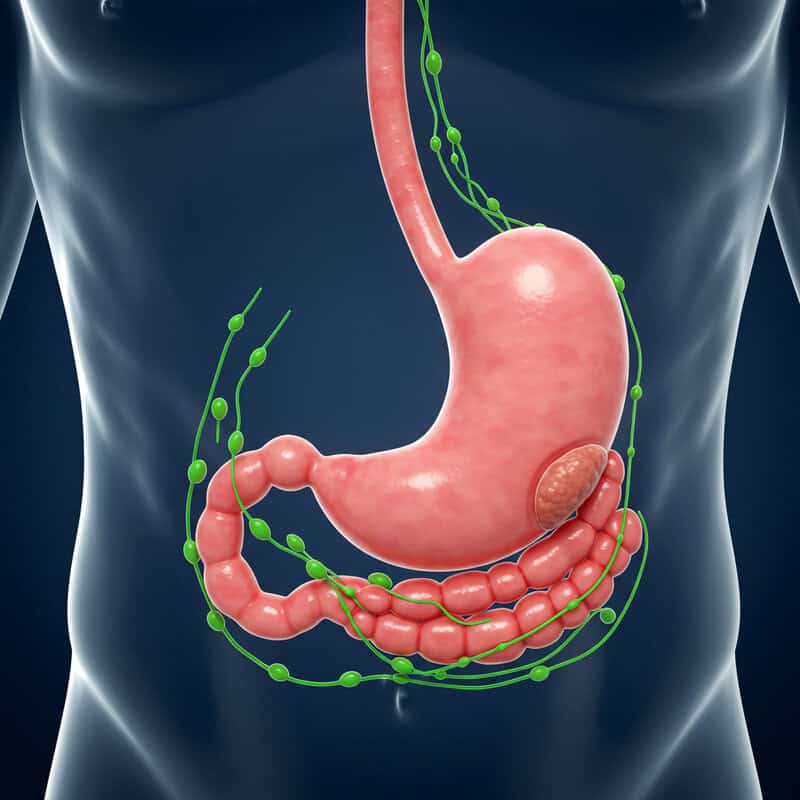
Swollen lymph nodes can be a sign that cancer has spread beyond the stomach to the lymphatic system. Lymph nodes act as filters for harmful substances and are a key part of the body’s immune response. When stomach cancer metastasizes, it often travels first to nearby lymph nodes, causing them to swell. Unlike the soft, tender swelling that occurs during an infection—such as a sore throat or cold—cancerous lymph nodes are typically firm, painless, and do not decrease in size as the infection resolves.
One area of particular concern is the lymph nodes above the collarbone, known as supraclavicular lymph nodes. Swelling in this region, especially on the left side (Virchow’s node), is sometimes associated with advanced stomach cancer. According to Cancer Treatment Centers of America, persistent, hard, or immobile lymph node swelling—especially when unaccompanied by symptoms of infection—should be evaluated by a healthcare professional. Regular self-examination for unusual lumps or swelling above the collarbone and elsewhere can aid in early detection. Any persistent or unexplained lymph node enlargement deserves prompt medical attention to determine the underlying cause and guide appropriate treatment.
20. Excessive Gas
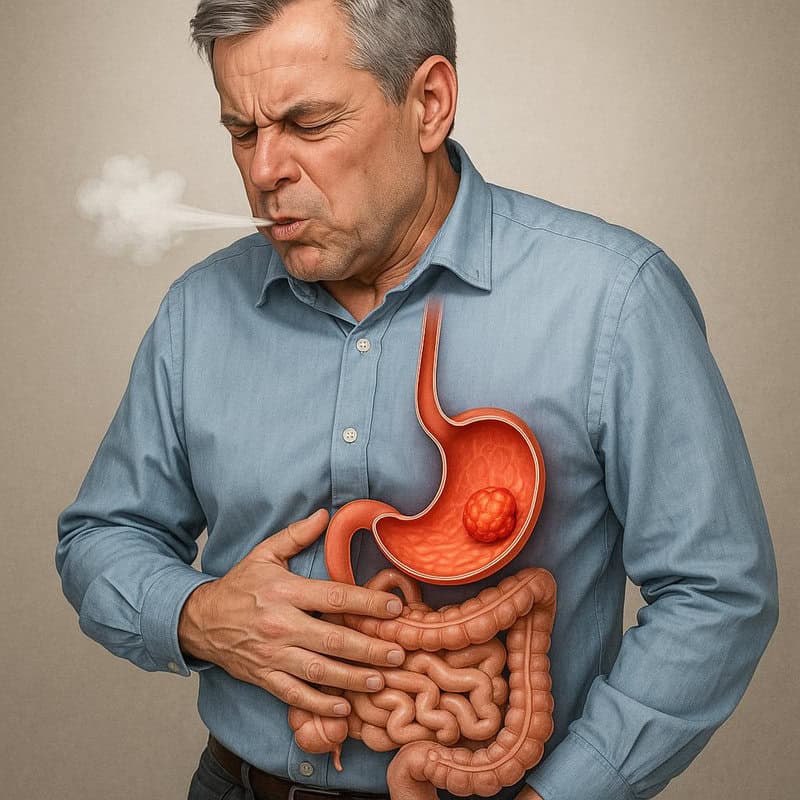
Excessive gas, or flatulence, is a common digestive complaint that can result from various benign causes, such as consuming high-fiber foods, carbonated beverages, or experiencing temporary changes in gut bacteria. However, when digestion is disrupted by a stomach tumor, the breakdown and movement of food through the gastrointestinal tract can be altered, leading to an abnormal increase in gas production. This may manifest as frequent burping, bloating, or the need to pass gas more often than usual, sometimes accompanied by other digestive discomforts.
Unlike the gas caused by dietary changes, which typically resolves once the offending food is eliminated or the digestive system adapts, gas linked to stomach cancer tends to persist and may worsen over time. It is especially concerning if it appears alongside unexplained weight loss, abdominal pain, early satiety, or changes in bowel habits. According to MD Anderson Cancer Center, new or excessive gas that cannot be explained by recent dietary changes and lasts for several weeks should prompt a conversation with a healthcare provider. Early evaluation is important for identifying the underlying cause and ensuring timely intervention if needed.
21. Loss of Muscle Mass

Loss of muscle mass, also known as muscle wasting or cachexia, is a significant concern in individuals with stomach cancer. Cancer cachexia is a complex syndrome characterized by involuntary weight and muscle loss, often driven by metabolic changes caused by the tumor. The body begins to break down muscle tissue for energy, even when fat stores are still present. This process is distinct from the gradual and predictable muscle loss that occurs with aging, which can often be mitigated through exercise and adequate nutrition.
People experiencing cancer-related muscle loss may notice a decrease in muscle tone, shrinking limbs, or weakness that interferes with daily activities. Unlike age-related sarcopenia, cancer cachexia often progresses rapidly and is not easily reversed with increased food intake or physical activity. According to American Cancer Society, unintended muscle loss—especially when accompanied by loss of appetite, fatigue, or other digestive symptoms—should not be ignored. Monitoring muscle changes, such as increased difficulty climbing stairs, lifting objects, or changes in how clothing fits, can help identify this early warning sign. Early recognition enables timely intervention and better management of nutritional and medical needs.
22. Acidic Taste in Mouth
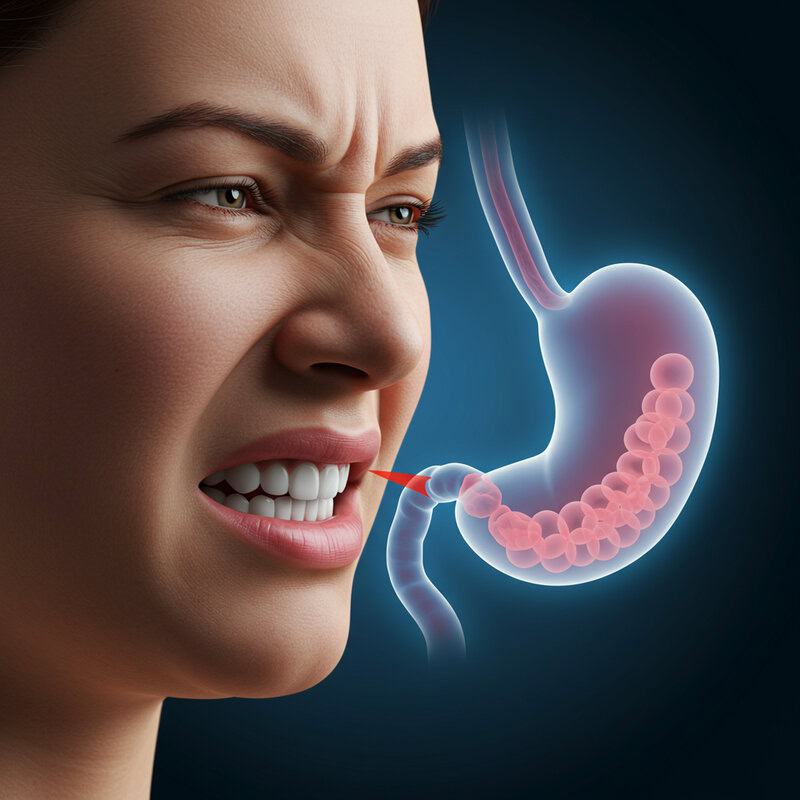
An acidic or sour taste in the mouth is frequently linked to gastroesophageal reflux, a condition where stomach acid and partially digested food flow back up into the esophagus and sometimes into the mouth. In the context of stomach cancer, tumors can disrupt the normal function of the stomach and esophageal sphincter, increasing the likelihood of reflux. This persistent reflux can leave a lingering acidic taste, even when you haven’t just eaten or experienced typical heartburn symptoms. This sensation is different from the temporary acid taste that occurs after vomiting, which usually resolves quickly as the stomach settles.
If you notice a new, ongoing sour or metallic taste in your mouth—especially if it’s accompanied by other digestive symptoms like heartburn, indigestion, or difficulty swallowing—it’s important not to dismiss it. According to Cancer Treatment Centers of America, a new and persistent acidic or unpleasant taste in the mouth may indicate underlying digestive issues, including stomach cancer. If this symptom lasts more than a couple of weeks or worsens over time, seeking advice from a healthcare provider is recommended. Early assessment can help determine the cause and guide appropriate treatment or further investigation if necessary.
23. Unusual Smell on Breath

An unusual or persistent bad odor on the breath, also known as halitosis, can sometimes be a sign of underlying stomach problems, including cancer. Stomach tumors may cause poor gastric emptying, leading to the retention of food particles and the growth of odor-causing bacteria in the digestive tract. This can result in a foul, sour, or even metallic smell that does not improve with regular oral hygiene. In contrast, halitosis due to dental issues typically arises from gum disease, tooth decay, or poor oral care and is usually resolved with professional dental cleaning and improved brushing and flossing habits.
If you notice persistent bad breath that does not respond to standard dental interventions, especially when accompanied by digestive complaints such as indigestion, nausea, or changes in appetite, it is important to consider a gastrointestinal source. According to Cancer Treatment Centers of America, ongoing halitosis that is unexplained by dental or dietary causes may warrant both dental and medical evaluations. A dentist can rule out oral health issues, while a physician can investigate potential gastrointestinal disorders, including stomach cancer, ensuring that any underlying problems are addressed promptly and appropriately.
24. Persistent Hiccups

Hiccups are typically harmless and short-lived, often triggered by eating too quickly, drinking carbonated beverages, or sudden changes in temperature. However, persistent or recurrent hiccups that last more than 48 hours can signal underlying medical problems, including cancer. In the case of stomach cancer, tumors may irritate or press against the diaphragm—the muscle that separates the chest from the abdomen and plays a key role in breathing. This irritation can disrupt the normal rhythmic contractions of the diaphragm, leading to frequent or prolonged bouts of hiccups.
Unlike the benign hiccups that most people experience after eating or drinking rapidly, cancer-related hiccups are often more stubborn and may persist despite typical home remedies. According to Cancer Treatment Centers of America, persistent hiccups, especially when accompanied by other digestive symptoms like nausea, vomiting, or abdominal discomfort, should prompt a medical evaluation. If hiccups last more than two days, occur frequently without obvious cause, or are associated with weight loss or difficulty swallowing, it is important to seek advice from a healthcare professional. Early diagnosis can help address the underlying issue and improve symptom management.
25. Unexplained Night Sweats

Unexplained night sweats—episodes of excessive sweating during sleep—can be a distressing symptom and, in some cases, an early sign of cancer. In stomach cancer, chronic inflammation and changes in the body’s immune response may disrupt normal temperature regulation, leading to profuse sweating at night. This type of sweating is typically unrelated to the room temperature or the number of blankets used. While night sweats are commonly associated with infections such as tuberculosis or the flu, those caused by cancer are often persistent, drenching, and not accompanied by the usual signs of infection like fever, chills, or acute illness.
People experiencing cancer-related night sweats may wake up soaked, needing to change clothes or bed linens. The sweating may also be accompanied by other subtle symptoms, such as unexplained weight loss, fatigue, or loss of appetite. According to Cancer Treatment Centers of America, persistent, unexplained night sweats—especially when occurring alongside other gastrointestinal or systemic symptoms—should prompt evaluation by a healthcare provider. While there are many benign causes of night sweats, it is important not to overlook them when they are new, severe, or without an obvious explanation, as they could signal a more serious underlying condition like stomach cancer.
26. Mild Jaundice

Mild jaundice, characterized by a yellowing of the skin and the whites of the eyes, can sometimes emerge in advanced cases of stomach cancer. This occurs when the disease spreads to the liver or blocks the bile ducts, interfering with the normal flow of bile—a digestive fluid produced by the liver. When bile cannot drain properly, bilirubin, a yellow pigment in bile, accumulates in the bloodstream and deposits in body tissues. This form of jaundice is distinct from jaundice caused by hepatitis, where liver inflammation from a viral infection disrupts bilirubin processing and often comes with other symptoms like fatigue, abdominal pain, and dark urine.
In stomach cancer, jaundice usually develops gradually and may be accompanied by other signs of advanced disease, such as unexplained weight loss or abdominal swelling. According to the American Cancer Society, it is important to monitor for any changes in skin or eye color, especially if they are subtle or develop over time. Even mild jaundice should prompt medical evaluation, as it may indicate a serious underlying issue affecting the liver or biliary system. Early recognition allows for more timely diagnosis and intervention.
27. Swelling Above the Belly Button

Swelling or a noticeable lump above the belly button can be an early sign of an underlying problem in the upper abdomen, potentially including stomach cancer. This localized swelling may be caused by a tumor itself or by the enlargement of nearby lymph nodes as cancer spreads. The area may feel firm to the touch, and the swelling might persist or gradually increase in size. Unlike the soft, reducible swelling seen in an umbilical or epigastric hernia—which often becomes more prominent with coughing or straining and may disappear when lying down—cancer-related swelling typically remains constant and does not change with movement or position.
This symptom may be accompanied by other warning signs such as abdominal discomfort, loss of appetite, or unexplained weight loss. According to Cancer Treatment Centers of America, any new, persistent lump or swelling above the belly button should be evaluated by a healthcare provider. It is especially important to seek medical attention if the swelling is hard, growing, or associated with other digestive symptoms. Timely assessment can help distinguish between benign causes, such as hernias, and more serious conditions like stomach cancer, allowing for earlier diagnosis and intervention.
28. Reduced Exercise Tolerance

Reduced exercise tolerance refers to a decreased ability to perform physical activities that were once manageable, such as walking, climbing stairs, or participating in sports. In individuals with stomach cancer, this decline is often related to anemia and generalized weakness. Chronic blood loss from a tumor can lower red blood cell counts, reducing the body’s ability to transport oxygen efficiently. As a result, muscles tire more quickly, and people may find themselves short of breath or fatigued with minimal exertion. This is different from the shortness of breath seen in lung or heart conditions, where respiratory symptoms are often accompanied by coughing, wheezing, or chest discomfort.
People experiencing reduced exercise tolerance due to stomach cancer may notice that daily tasks—like carrying groceries or walking short distances—leave them unusually winded or tired, even if they have not changed their activity levels or routines. According to the American Cancer Society, it is important to track any changes in physical endurance and discuss them with a healthcare provider, especially if accompanied by other symptoms such as fatigue, pallor, or weight loss. Early recognition and investigation can help identify anemia or other underlying causes, leading to timely diagnosis and intervention.
29. Mild Depression or Mood Changes

Mild depression or subtle mood changes can be an early, often overlooked effect of chronic illnesses like stomach cancer. Ongoing inflammation, metabolic disturbances, and the psychological impact of persistent, unexplained symptoms can all influence brain chemistry and emotional well-being. People may experience feelings of sadness, irritability, loss of interest in normal activities, or increased anxiety without a clear cause. This is similar to the mood changes observed in thyroid disorders, where hormonal imbalances affect neurotransmitters and lead to symptoms such as low mood, fatigue, or anxiety.
Unlike depression that arises in response to life events or obvious psychological stressors, mood changes linked to chronic diseases can develop gradually and may not be immediately recognized by the affected individual or their loved ones. According to Cancer Treatment Centers of America, it is important to pay attention to persistent changes in mood or emotional state, especially when they occur alongside physical symptoms such as fatigue, weight loss, or digestive complaints. Early recognition of these changes and open discussion with a healthcare provider can lead to a more holistic evaluation, ensuring that both physical and mental health needs are addressed.
30. Changes in Bowel Habits
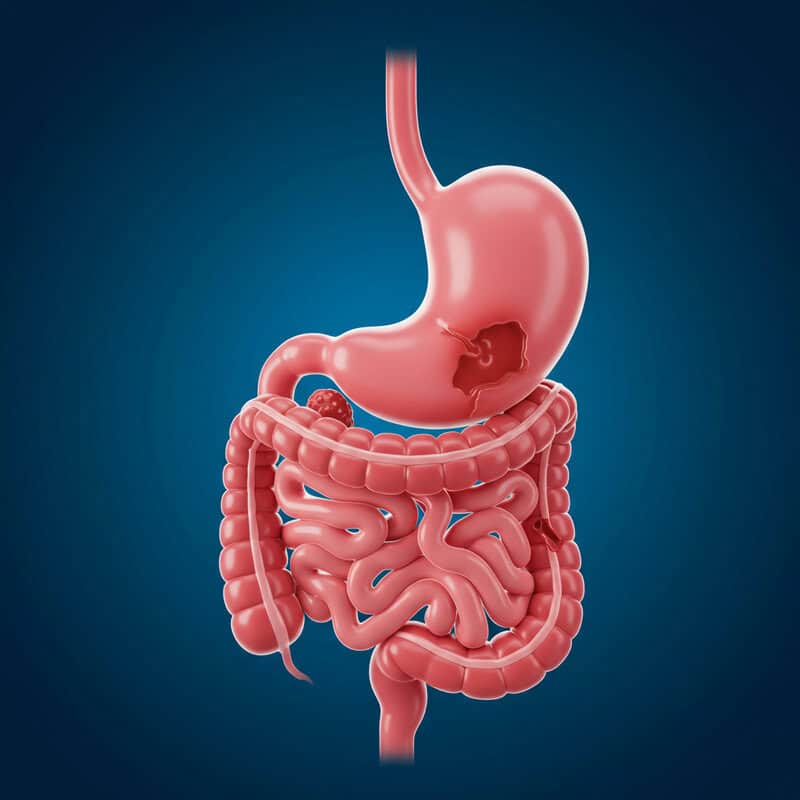
Changes in bowel habits, such as new-onset constipation, diarrhea, or alternating patterns of both, can sometimes signal underlying stomach cancer. Tumors may disrupt the normal movement of food and waste through the digestive tract, leading to irregularities in frequency, consistency, or ease of bowel movements. Unlike the temporary changes often experienced during periods of stress, travel, or dietary adjustments—which typically resolve within a few days—digestive changes linked to cancer tend to persist or gradually worsen.
For instance, a person who previously had regular bowel habits might notice increased difficulty passing stools or episodes of unexplained loose stools. These symptoms can also be accompanied by abdominal discomfort, bloating, or a sense of incomplete evacuation. According to American Cancer Society, new and lasting changes in bowel routines—especially if they persist for more than a few weeks or are accompanied by other warning signs like blood in the stool or weight loss—should not be ignored. Timely evaluation by a healthcare provider is important for distinguishing between benign causes such as irritable bowel syndrome (IBS) and more serious conditions like stomach cancer, ensuring appropriate diagnosis and care.
31. Loss of Interest in Food

Loss of interest in food is a subtle but significant symptom that can occur in the early stages of stomach cancer. Tumors can interfere with the body’s hunger and satiety signals by affecting the stomach lining, altering hormone levels, or directly disrupting nerve pathways. In addition, cancer-related inflammation or metabolic changes may lead to the development of taste aversions or a general disinterest in eating. This is distinct from the loss of appetite often seen in depression, where emotional factors play a more prominent role in reduced food intake, and enjoyment of previously liked foods may diminish for psychological reasons.
People with stomach cancer may find themselves leaving meals unfinished, skipping snacks, or feeling indifferent to food, regardless of the time of day or type of cuisine. This can result in unintentional weight loss and nutritional deficits over time. According to Cancer Research UK, tracking changes in dietary patterns, meal sizes, and food preferences is important—especially when loss of interest in food persists for more than a couple of weeks. If this symptom develops alongside other digestive complaints or unexplained changes in health, prompt consultation with a healthcare provider is recommended for further investigation.
32. Chronic Cough
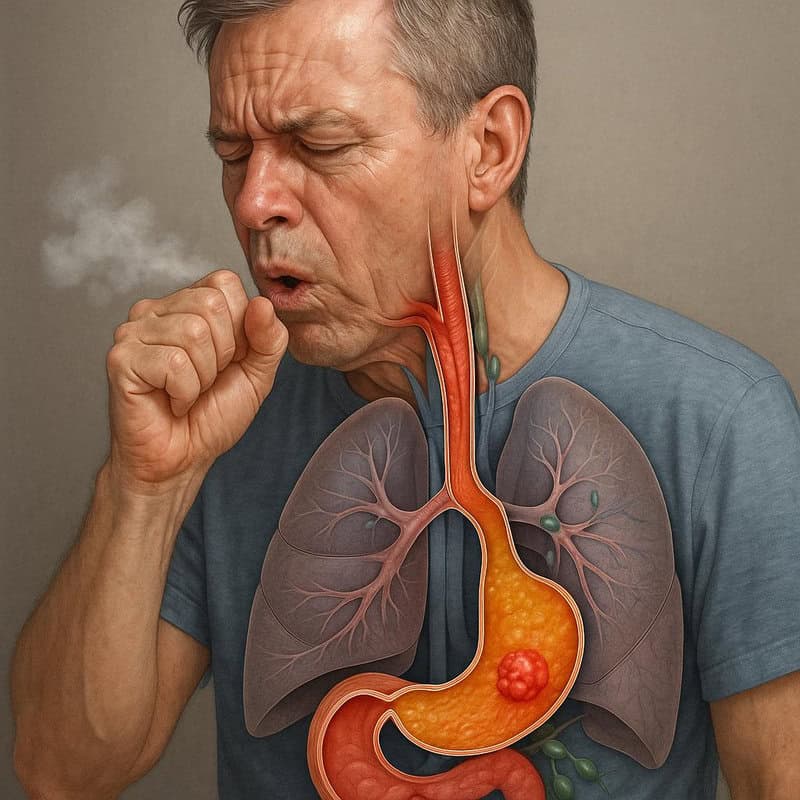
A chronic cough is a lingering cough that lasts for weeks or even months and can sometimes be linked to stomach cancer. Tumors located near the junction of the stomach and esophagus can cause acid reflux, which irritates the lining of the throat and airways, triggering a persistent cough. Additionally, advanced stomach cancer may spread to the lungs or lymph nodes, resulting in respiratory symptoms. This type of cough is different from the seasonal or environmental coughs frequently seen with allergies, which are often accompanied by sneezing, nasal congestion, or itchy eyes and usually resolve with antihistamines or avoidance of triggers.
In contrast, a cough related to stomach cancer tends to be unresponsive to over-the-counter remedies and may be worse after eating or when lying down. It can also be accompanied by other symptoms such as heartburn, difficulty swallowing, or unexplained weight loss. According to Cancer Treatment Centers of America, a persistent cough that cannot be explained by allergies, infection, or other obvious causes should be evaluated by a healthcare provider. Early investigation is essential, as chronic cough can be a warning sign of gastrointestinal or metastatic disease requiring prompt attention.
33. Mild Shortness of Breath

Mild shortness of breath, or dyspnea, can occur in individuals with stomach cancer, often as a result of anemia caused by chronic blood loss from the tumor. Anemia lowers the number of red blood cells available to carry oxygen throughout the body, leading to a feeling of breathlessness during physical activity or even at rest. This differs from the breathlessness seen in asthma, which is usually accompanied by wheezing, chest tightness, and is triggered by allergens, exercise, or cold air. Asthmatic symptoms typically respond well to inhalers and specific medications, whereas anemia-related shortness of breath may not improve until the underlying blood deficiency is corrected.
People may notice that routine activities, such as climbing stairs or walking short distances, become more challenging and leave them feeling winded or lightheaded. According to American Cancer Society, any new or unexplained shortness of breath should be evaluated promptly, especially if it is persistent or associated with other symptoms such as fatigue, pale skin, or unexplained weight loss. Early assessment can help identify anemia or other underlying causes and ensure that appropriate treatment and further investigation are undertaken if necessary.
34. Change in Taste Preferences

A change in taste preferences is a subtle but important symptom that can be associated with stomach cancer, either due to the cancer itself or as a side effect of treatment. Tumors can affect the way the body processes flavors by altering the release of digestive enzymes, hormones, or through chronic inflammation. People may notice that foods they once enjoyed now taste bland, metallic, or unpleasant, or they may develop new aversions to specific tastes or textures. This phenomenon is somewhat similar to the shifts in taste preferences commonly experienced during pregnancy, where hormonal changes can cause cravings or strong dislikes for certain foods.
Unlike temporary changes in taste that resolve after an illness or dietary change, cancer-related alterations often persist and may worsen over time. According to Cancer Treatment Centers of America, tracking new or persistent changes in taste—such as a sudden dislike for meat, coffee, or sweet foods—can provide valuable information for healthcare providers. It’s important to note and discuss any new aversions, loss of pleasure in eating, or unusual flavor experiences, especially if they are accompanied by other digestive symptoms or unexplained weight loss, as early recognition may prompt further investigation and timely care.
35. Mild Abdominal Lump
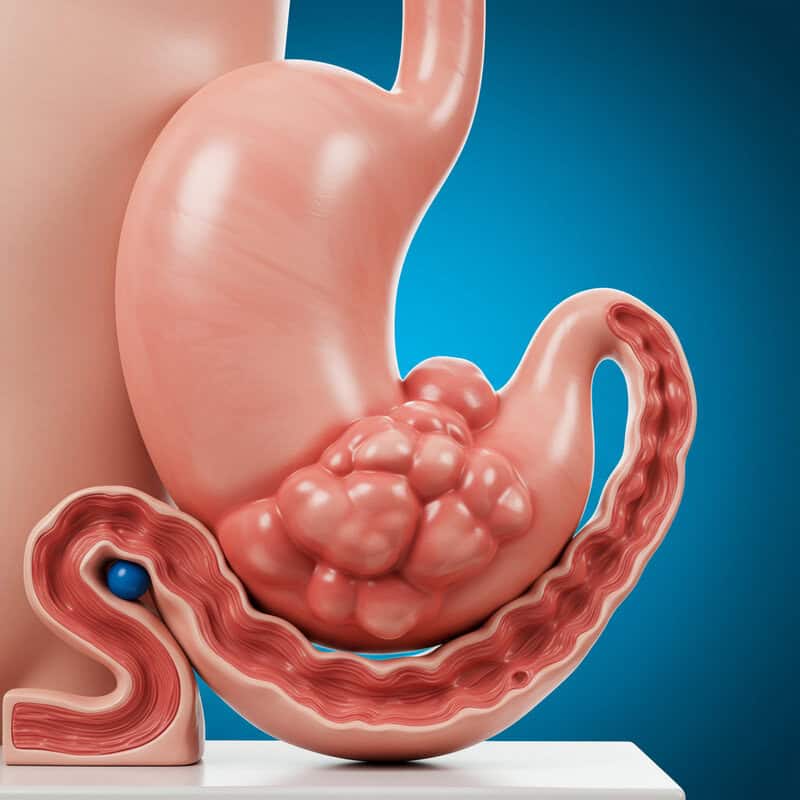
A mild abdominal lump is a physical finding that can sometimes indicate a mass or tumor within the stomach or adjacent tissues. As stomach cancer progresses, a tumor may become large enough to be felt through the abdominal wall, especially if it is located near the surface. This lump may feel firm, irregular, or fixed in place, and is often painless in the early stages. In contrast, benign cysts or lipomas—non-cancerous fatty lumps—are usually softer, mobile, and slow-growing, and rarely cause additional symptoms unless they press on nearby structures.
Discovering a new lump in the abdomen should always prompt further evaluation, particularly if it appears suddenly, grows over time, or is associated with other warning signs such as weight loss, pain, or changes in appetite. According to the Cancer Research UK, any new or unexplained abdominal mass warrants urgent assessment by a healthcare provider to determine its cause. Early investigation may involve physical examination, imaging studies, and possibly a biopsy to distinguish between benign and malignant growths. Timely diagnosis is crucial for ensuring the best possible outcome and for guiding appropriate treatment if cancer is identified.
36. Abdominal Cramps
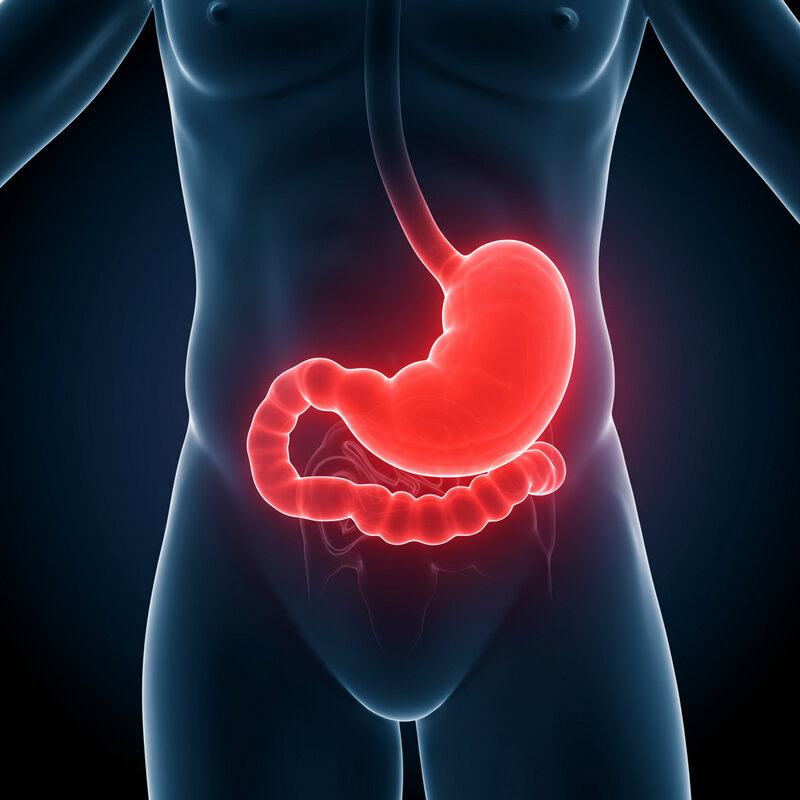
Abdominal cramps are a common digestive complaint, but when persistent or severe, they can be a warning sign of underlying conditions such as stomach cancer. Tumors can disturb the normal motility of the stomach or create partial blockages, leading to irregular contractions and spasms within the digestive tract. This disruption may result in intermittent or continuous cramping pain, often accompanied by other symptoms like bloating, nausea, or changes in bowel habits. In contrast, cramps from food intolerances—such as lactose or gluten intolerance—tend to be linked to specific foods, appear soon after eating, and usually resolve once the offending food is eliminated from the diet.
Cramping caused by a tumor may not have an obvious trigger and can worsen over time as the tumor grows or causes more significant obstruction. According to Cancer Research UK, persistent or severe abdominal cramping—especially if accompanied by unexplained weight loss, vomiting, or blood in the stool—should be evaluated by a healthcare professional. Early assessment is key to identifying the underlying cause, distinguishing between benign digestive issues and more serious conditions, and beginning appropriate treatment as soon as possible.
37. Mouth Ulcers
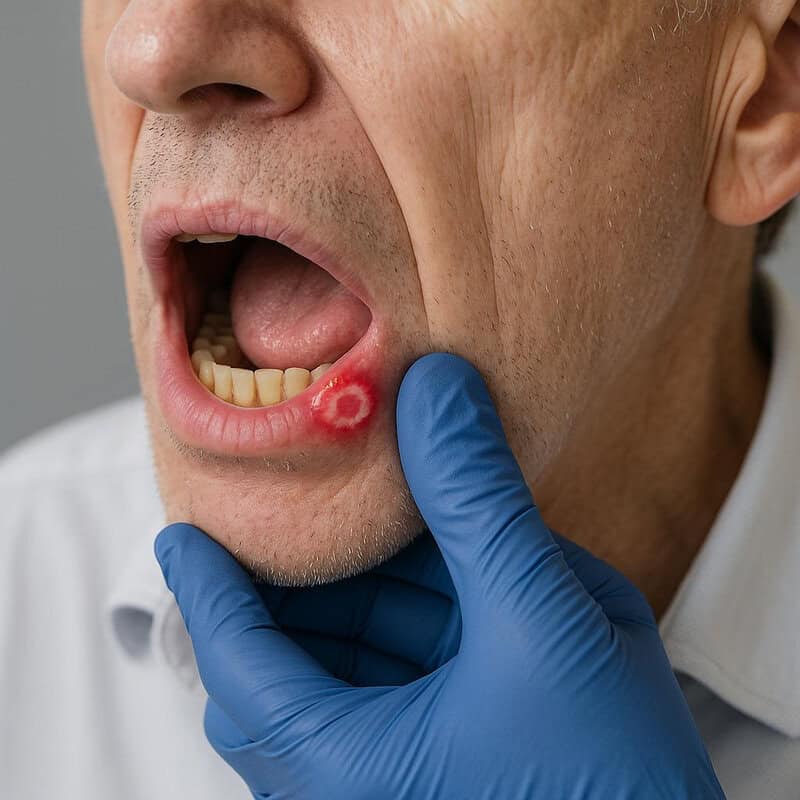
Mouth ulcers, or sores inside the mouth, can sometimes be linked to nutritional deficiencies that arise from stomach cancer. As the cancer impairs the body’s ability to absorb essential nutrients—such as iron, vitamin B12, and folate—these deficiencies can manifest as painful, recurrent ulcers on the gums, tongue, or inner cheeks. This is different from mouth ulcers caused by viral infections like herpes simplex, which often appear suddenly, are accompanied by fever or swollen glands, and typically resolve within a week or two.
Ulcers associated with nutritional deficiencies may persist, recur frequently, or heal slowly, and are often accompanied by other symptoms such as fatigue, pallor, or changes in appetite. According to Cancer Treatment Centers of America, persistent mouth sores—especially those lasting longer than two weeks, recurring without clear cause, or accompanied by other systemic symptoms—should prompt a medical evaluation. Early diagnosis can help identify underlying deficiencies or more serious causes, including gastrointestinal malignancies. Monitoring the duration, location, and frequency of mouth ulcers and discussing them with a healthcare provider is important for timely intervention and comprehensive care.
38. Itchy Skin

Itchy skin, or pruritus, can occasionally be a sign of systemic illness, including advanced stomach cancer. When stomach cancer spreads to the liver or blocks the bile ducts, it can lead to jaundice—an accumulation of bilirubin in the blood. Elevated bilirubin levels may deposit in the skin, causing intense, persistent itching. This type of itch is often generalized and does not respond to typical over-the-counter remedies. In contrast, itching from allergies or skin conditions such as eczema is usually accompanied by a visible rash, redness, or swelling and can be relieved by antihistamines or topical creams.
Unexplained itching related to liver involvement is more likely to be widespread and may be accompanied by other symptoms of jaundice, such as yellowing of the skin and eyes or dark urine. According to Cancer Research UK, persistent, unexplained itch—especially if it is associated with changes in skin color, fatigue, or digestive complaints—should be evaluated by a healthcare provider. Monitoring for new or worsening itching and seeking medical advice when it occurs without an obvious cause can help identify underlying systemic conditions, including cancer, at an earlier and more manageable stage.
39. Swelling in Legs

Swelling in the legs, also known as peripheral edema, can develop in individuals with stomach cancer due to several mechanisms. One common cause is low blood protein levels (hypoalbuminemia), which may result from poor nutrition, impaired absorption, or chronic illness. Reduced protein in the blood allows fluid to leak from blood vessels into surrounding tissues, causing noticeable swelling in the feet, ankles, or lower legs. Additionally, cancer can increase the risk of blood clots (deep vein thrombosis), which can also cause one-sided or asymmetric leg swelling. This differs from swelling due to heart failure, where fluid retention typically affects both legs and may be accompanied by shortness of breath or chest discomfort.
Leg swelling linked to cancer is often persistent and may worsen throughout the day or after prolonged standing. According to the Cancer Treatment Centers of America, new or unexplained swelling in one or both legs should prompt a thorough evaluation by a healthcare provider, especially if it is accompanied by other symptoms such as fatigue, weight loss, or abdominal changes. Early assessment can help determine the underlying cause—whether nutritional, vascular, or related to cancer progression—and ensure that appropriate treatment or preventive measures are implemented.
40. Delayed Gastric Emptying

Delayed gastric emptying, or gastroparesis, occurs when the stomach empties its contents into the small intestine more slowly than normal. In stomach cancer, tumors can physically obstruct the stomach’s exit or disrupt the nerves that control muscle contractions, leading to a backlog of food and digestive fluids. This can cause persistent sensations of fullness after eating only a small meal, bloating, nausea, and sometimes vomiting of undigested food hours after eating. The symptoms may worsen over time, especially as the tumor grows or the obstruction becomes more severe.
This condition is similar to gastroparesis seen in individuals with diabetes, where damage to the stomach’s nerves impairs motility. However, while diabetic gastroparesis typically develops gradually and is associated with fluctuating blood sugar levels, delayed gastric emptying from cancer often progresses more rapidly and is linked to additional warning signs such as unexplained weight loss or abdominal pain. According to Cancer Research UK, new or worsening symptoms of early satiety, persistent bloating, or vomiting undigested food should always be evaluated by a healthcare provider to rule out obstructive causes like stomach cancer and ensure prompt intervention.
41. Increased Thirst

Increased thirst, or polydipsia, can be an indirect symptom of stomach cancer, often resulting from dehydration caused by persistent vomiting, chronic blood loss, or reduced fluid intake due to loss of appetite or nausea. When the body loses fluids faster than they are replaced, it triggers a strong urge to drink more to maintain hydration. In contrast, increased thirst in conditions like diabetes is primarily driven by high blood sugar levels, which cause the kidneys to excrete more water, leading to frequent urination and subsequent dehydration.
While occasional thirst is normal, especially after exercise or in hot weather, persistent or unexplained increases in thirst should not be ignored—particularly if they are accompanied by other symptoms such as dry mouth, dark urine, dizziness, or signs of gastrointestinal distress. According to Cancer Treatment Centers of America, ongoing or severe thirst in the context of vomiting, blood loss, or significant dietary changes warrants prompt medical evaluation. Monitoring and reporting lasting changes in thirst or hydration can help identify underlying causes, including gastrointestinal cancers, and ensure timely intervention to prevent complications from dehydration or more serious underlying health problems.
42. Unexplained Bruising

Unexplained bruising, or the appearance of bluish or purple marks on the skin without obvious injury, can be a sign of bleeding tendencies in individuals with stomach cancer. Chronic blood loss from a tumor or the spread of cancer to the bone marrow can lead to a decrease in platelets, the blood cells responsible for clotting. When platelets are low, even minor bumps can cause significant bruising, and spontaneous bruises may appear in unusual places such as the trunk, arms, or legs. This is different from bruising caused by direct trauma, which is usually localized, has a clear cause, and heals in a predictable manner.
If you notice bruises arising with no recollection of injury or that seem to develop more easily and take longer to heal, it may indicate an underlying blood or bone marrow disorder. According to the American Cancer Society, unexplained or frequent bruising should prompt blood tests to assess platelet levels and overall blood health. Early recognition and evaluation are crucial for identifying serious conditions, such as cancer-related bleeding disorders, and ensuring timely and appropriate medical intervention.
43. Persistent Bad Taste

A persistent bad taste in the mouth, such as a metallic, bitter, or sour flavor, can be a subtle warning sign of stomach cancer. Tumors can affect digestion and alter the release of gastric secretions, which may lead to regurgitation or reflux of stomach contents into the mouth. These changes can leave an unpleasant taste that lingers regardless of eating, brushing teeth, or using mouthwash. While medications—such as certain antibiotics, antihistamines, or blood pressure drugs—can also cause changes in taste, these side effects typically resolve once the medication is discontinued and are often noted on prescription labels.
The bad taste associated with stomach cancer or poor digestion is often more persistent and may not have an obvious cause. It can also be accompanied by other symptoms like loss of appetite, nausea, or unintended weight loss. According to Cancer Treatment Centers of America, new or unexplained taste changes—especially when they last more than a couple of weeks and cannot be linked to diet, medication, or dental issues—should prompt further medical evaluation. Early follow-up allows for investigation of underlying digestive disorders, ensuring timely diagnosis and management if cancer or another serious condition is present.
44. Hoarseness

Hoarseness, or a change in the quality of your voice—such as becoming raspy, breathy, or weak—can occasionally be linked to stomach cancer, particularly when chronic acid reflux is involved. Tumors near the upper stomach or esophagus can cause acid and digestive juices to flow backward into the throat, irritating the larynx (voice box) and vocal cords. Persistent exposure to stomach acid can inflame and damage these tissues, leading to ongoing hoarseness. In advanced cases, cancer may also spread to lymph nodes or tissues near the vocal cords, further contributing to voice changes.
This type of hoarseness is different from the temporary, self-limiting hoarseness commonly seen with colds, viral infections, or after shouting, which typically resolves within a week or so. According to Cancer Treatment Centers of America, hoarseness lasting longer than two weeks—particularly when not associated with a recent respiratory infection—should be considered a red flag and prompt a medical evaluation. Persistent hoarseness, especially when accompanied by symptoms like swallowing difficulties, chronic cough, or unexplained weight loss, may indicate an underlying digestive or respiratory issue, including cancer, and warrants further investigation by a healthcare provider.
45. Swelling Around Eyes

Swelling around the eyes, or periorbital edema, can occur when the body experiences low protein levels or fluid imbalances—both of which may be complications of stomach cancer. When a tumor disrupts normal digestion and protein absorption, or when chronic illness leads to malnutrition, the resulting drop in blood protein (albumin) allows fluid to escape from blood vessels and accumulate in soft tissues, most noticeably around the eyes. This swelling is often most apparent upon waking and may persist or become more pronounced throughout the day.
This form of swelling differs from the temporary puffiness caused by allergies or lack of sleep, which is usually associated with itching, redness, or irritation and often improves with antihistamines or rest. According to Cancer Treatment Centers of America, new or persistent swelling around the eyes—especially when accompanied by other symptoms such as leg swelling, fatigue, or signs of malnutrition—should prompt medical evaluation. Monitoring for changes in facial appearance and seeking timely medical advice can help identify underlying causes, including protein loss, kidney issues, or systemic disease, allowing for appropriate diagnosis and intervention.
46. Persistent Dry Mouth
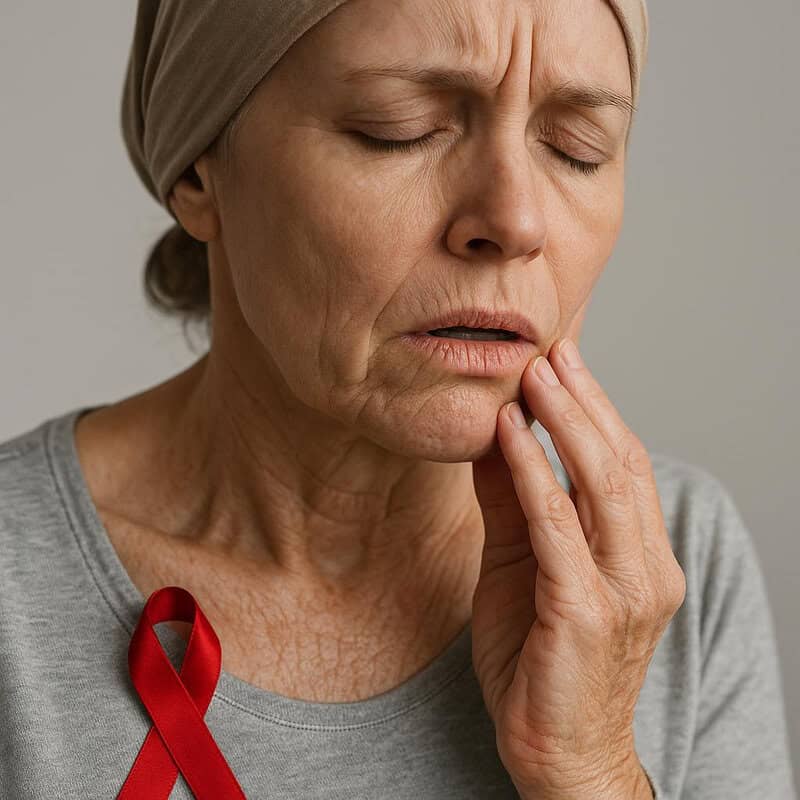
Persistent dry mouth, or xerostomia, can be a symptom experienced by individuals with stomach cancer, often as a result of dehydration from chronic vomiting, reduced fluid intake, or side effects of medications used to manage symptoms. Dehydration reduces the production of saliva, leading to a constant sensation of dryness, difficulty swallowing, changes in taste, and an increased risk of dental problems. This is different from the dry mouth seen in autoimmune conditions such as Sjogren’s syndrome, where immune system dysfunction directly targets the salivary glands, often accompanied by dry eyes and other systemic symptoms.
In the context of cancer, dry mouth may be persistent and worsen over time, especially if accompanied by other signs of fluid loss such as dark urine, dizziness, or cracked lips. According to Cancer Treatment Centers of America, ongoing dryness that does not improve with increased hydration or oral care should prompt evaluation by a healthcare provider. Identifying the underlying cause is important, as persistent dry mouth can impact nutrition, oral health, and overall quality of life. Early intervention can help address dehydration, adjust medications, and manage any contributing medical conditions.
47. Increased Sensitivity to Smells

Increased sensitivity to smells, known as hyperosmia, can sometimes develop in individuals with serious illnesses, including stomach cancer. This heightened perception may be due to metabolic or hormonal changes triggered by the disease, or as a side effect of certain medications. People may find that everyday odors—such as cooking aromas, perfumes, or cleaning products—suddenly become overwhelming or unpleasant, sometimes even triggering nausea or loss of appetite. This phenomenon is similar to the increased sensitivity experienced during pregnancy, where hormonal fluctuations cause previously tolerable smells to become intolerable or even repulsive.
Unlike the temporary aversions that occur with viral infections or after exposure to a particularly strong odor, heightened smell sensitivity related to illness tends to be persistent and may interfere with daily routines or eating habits. According to Cancer Treatment Centers of America, new or lasting changes in the way you perceive smells—or the development of strong aversions to common odors—should be noted and discussed with your healthcare provider, especially if accompanied by changes in taste, appetite, or weight. Tracking these changes can help with early detection and more effective management of underlying health issues.
48. Bleeding Gums

Bleeding gums can be an indicator of underlying health issues in people with stomach cancer. Chronic blood loss from a tumor or the spread of cancer to the bone marrow can result in low platelet counts, impairing the blood’s ability to clot and leading to spontaneous or easily provoked gum bleeding. Additionally, stomach cancer may cause vitamin deficiencies—especially of vitamin C and vitamin K—due to poor absorption or malnutrition, further increasing the risk of bleeding. This differs from gum disease (gingivitis or periodontitis), where bleeding is usually related to plaque buildup, swelling, and poor dental hygiene, and tends to improve with regular brushing and flossing.
When bleeding gums persist despite good oral hygiene or occur frequently without obvious cause, it may be a sign of a more serious systemic issue. According to Cancer Treatment Centers of America, unexplained or persistent gum bleeding—especially when accompanied by other symptoms such as easy bruising, fatigue, or changes in appetite—should be evaluated by a healthcare provider. Blood tests and a nutritional assessment can help identify the cause and guide appropriate management, ensuring that any underlying deficiencies or blood disorders are addressed promptly.
49. Rash or Skin Changes

Rash or unexplained skin changes can sometimes be a manifestation of underlying stomach cancer, particularly as part of a group of symptoms known as paraneoplastic syndromes. These skin changes arise when cancer triggers abnormal immune responses or releases substances that affect distant parts of the body. Examples include acanthosis nigricans (dark, velvety patches often found in body folds), dermatomyositis (purple or reddish rashes, sometimes with muscle weakness), or sudden onset of multiple seborrheic keratoses (benign, wart-like growths). These are distinct from common rashes like eczema or contact dermatitis, which are usually linked to irritants, allergies, or infections and tend to respond to topical treatments.
Unlike routine skin conditions, paraneoplastic skin changes may develop rapidly, spread, or persist despite standard therapies. They may also be accompanied by other systemic symptoms such as weight loss, fatigue, or digestive complaints. According to Cancer Research UK, any new, unusual, or persistent rash or skin change—especially when unexplained and associated with other warning signs—should prompt medical evaluation. Identifying and addressing these skin manifestations can lead to earlier investigation of potential internal malignancies, including stomach cancer.
50. Difficulty Absorbing Nutrients

Difficulty absorbing nutrients, or malabsorption, can develop as stomach cancer disrupts the normal processes of digestion and nutrient uptake. Tumors may interfere with the secretion of gastric acids and enzymes, hinder the mechanical mixing of food, or block the passage of partially digested food into the small intestine. As a result, essential vitamins and minerals—such as vitamin B12, iron, and folate—may not be properly absorbed, leading to deficiencies that manifest as fatigue, weakness, mouth ulcers, or neurological symptoms. This malabsorption is similar to what occurs in celiac disease, where inflammation from gluten exposure damages the intestinal lining, but in stomach cancer, the disruption is caused by the tumor’s physical presence and metabolic effects.
Signs of nutritional deficiency may develop gradually, including unexplained weight loss, brittle nails, thinning hair, or pale skin. According to American Cancer Society, persistent symptoms of poor nutrient absorption should not be ignored—especially if they develop alongside digestive complaints like bloating, diarrhea, or loss of appetite. Early recognition and laboratory testing can help identify deficiencies, guide nutritional interventions, and prompt further investigation for underlying causes, such as stomach cancer, to ensure timely and comprehensive care.
Conclusion

Recognizing the early signs of stomach cancer can make a critical difference in receiving timely, effective treatment and improving outcomes. Many symptoms are subtle and easily mistaken for less serious conditions, so ongoing vigilance is essential. If you experience any persistent, unexplained symptoms—such as changes in appetite, digestion, or physical appearance—consult a healthcare provider promptly. Early evaluation, including appropriate diagnostic tests or participation in recommended screening programs, can lead to earlier detection and better prognosis. For more information on screening and prevention, visit the American Cancer Society’s stomach cancer screening page. Taking proactive steps can safeguard your health and provide peace of mind.
Disclaimer
The information provided in this article is for general informational purposes only. While we strive to keep the information up-to-date and correct, we make no representations or warranties of any kind, express or implied, about the completeness, accuracy, reliability, suitability, or availability with respect to the article or the information, products, services, or related graphics contained in the article for any purpose. Any reliance you place on such information is therefore strictly at your own risk.
In no event will we be liable for any loss or damage including without limitation, indirect or consequential loss or damage, or any loss or damage whatsoever arising from loss of data or profits arising out of, or in connection with, the use of this article.
Through this article you are able to link to other websites which are not under our control. We have no control over the nature, content, and availability of those sites. The inclusion of any links does not necessarily imply a recommendation or endorse the views expressed within them.
Every effort is made to keep the article up and running smoothly. However, we take no responsibility for, and will not be liable for, the article being temporarily unavailable due to technical issues beyond our control.





